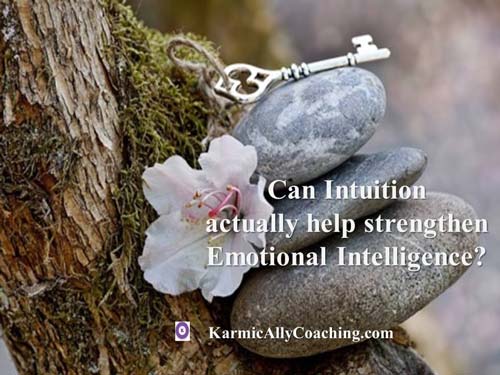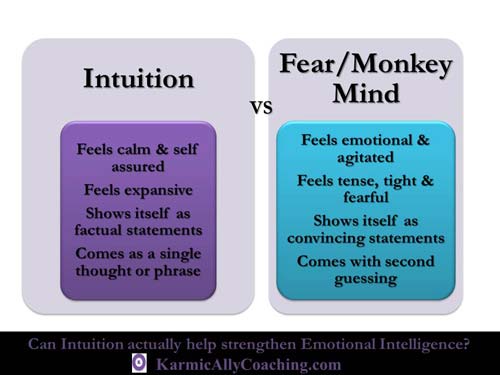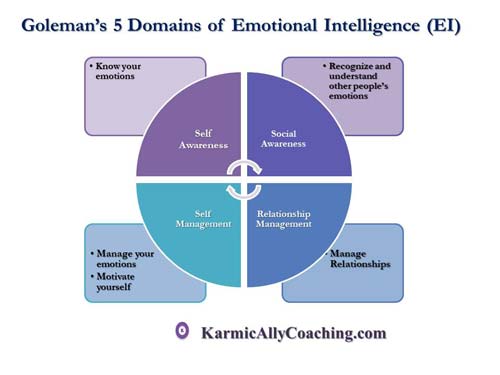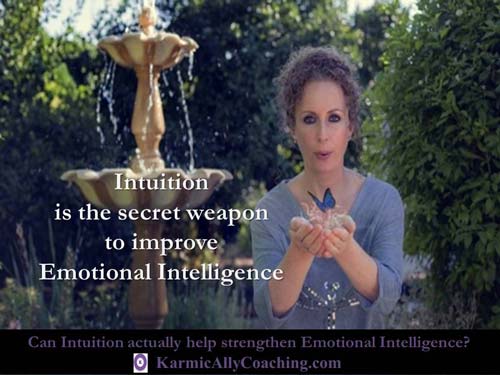This post has already been read 3391 times!

I’m of the firm belief that professionals who master the skill of Intuition demonstrate higher levels of Emotional Intelligence.
Back in the days when I worked in the Insurance industry in Poland, my boss the Managing Director of our company was always able to predict how our insurance agents or clients would react when it came to difficult claims.
He knew how to get our annual budgets not only passed by Headquarters, but also get us more in the region spend.
This was around the time that Daniel Goleman published his bestselling book Emotional Intelligence: Why It can Matter More than IQ. We in the office didn’t know about it yet because it took time for us to get the latest books in Poland.
Instead, the entire office thought he was a psychic, possessed ESP and a whole lot of other attributes! We were in complete awe of him and he was our Hero.
If you look back at your professional career, you’ll realize that there will be at least 1 occasion when a manager or colleague has come up with a crisis management solution that saved the day.
When asked how they found the solution, they’d have put it down to a gut feeling or something telling them ‘this might just work’.
Actually, it was their skill of intuition at play. Rationalizing the ‘out of the box’ solution using logic came later.
If you think about it, in today’s world, you might say they possessed a strong Emotional Quotient too.
In my post Emotional Intelligence: you need to apply authentic kind of Empathy, I covered how the skill of empathy affected the domains of Social Awareness and Relationship Management
In this post, let’s explore Intuition as a skill for demonstrating Self Awareness and Self-Management.
Karmic Ally Coaching’s Quick Guide to Intuition
In simple English, Intuition is a form of instinctive knowing without the use of reasoning processes. It’s a natural ability that all people can develop and enhance.
Quite often people misunderstand intuition as being a power possessed through metaphysical techniques and meditation. While I have shown how to develop this skill in my post Are Psychic Powers Really a Fringe Benefit of Meditation?, there is more to it.
Intuition is one way our brain communicates with our conscious mind by subtle means such as Thoughts, Feelings, Sensations, Imagery and Sounds or various combinations of these.
Intuition appears to be a function of both our head and our heart and can involve any part of our body as it attempts to guide and direct our thoughts. Some people feel it in their solar plexus or gut. Others can feel a tingling sensation followed by an out of the blue thought.
Once you have an awareness of the forms of language your subconscious is using you can practice tuning in. Your strongest signals from intuition will come when you’re feeling calm and relaxed. This is why a daily practice of meditation, prayer or any other ritual that helps relax the mind is essential.
Intuition should flow naturally and easily without any struggle between the ‘brain’ and ‘heart’ and is devoid of emotion.
The emotion part is important because if you are experiencing an emotion, then it isn’t your intuition that is being engaged but your monkey mind chatter or fear that is talking.
This table gives a quick comparison of how to differentiate between the two.

Intuition is the secret weapon to improve Emotional Intelligence
Now that we understand intuition, how does it fit into demonstrating emotional intelligence?
When we look at Goleman’s definition of Emotional Intelligence
“Understanding one’s own feelings, empathy for the feelings of others and the regulation of emotions in a way that enhances living”,
the role of intuition becomes apparent. There are times when as professionals who provide a service, we simply have to go with our gut feeling, stay in control of our emotions and read other people the right way to create a viable resolution in a timely manner.
Looking at the domains of Self Awareness and Self -Management, the key skills are Know Yourself, Manage your emotions and motivate yourself.

Knowing oneself means understanding how you feel and accurately assessing your state of mind while self –management requires the skills to control our emotions and our behavioral tendencies.
It means not listening to or being controlled by fear. Instead rely on our observations to handle situations from a place of calm without letting our emotions get the better of us.
Interestingly, the very actions that can help us demonstrate emotional intelligence are the same ones that strengthen our intuition!

The intuition that we discussed earlier is basic intuition whereas in fact, according to William Duggan, author of “Strategic Intuition: The Creative Spark in Human Achievement,” there are three levels of intuition: basic, expert and strategic.
Basic intuition is the commonly known “gut instinct.” Expert intuition is a snap judgment, similar to what happens when you recognize something you’re familiar with. Strategic intuition is a clear thought.
All 3 types of intuition have the same feeder of experiencing the world around us. The information that we feed our sub-conscious mind allows our intuition to work out the best solution even when we cannot explain it rationally.
In the case of my boss who displayed a high Emotional Quotient (he never got upset even when the rest of us experienced headless chicken moments) he definitely applied expert and strategic intuition as the situation required.
I go into greater detail on how to improve your EI score with specific exercises to improve scores for these 2 domains in my mini-course Emotional Intelligence – the Basics.
For the purposes of starting our journey to improve our basic intuitive skills, I recommend the Quick Coherence Technique from the HeartMath Institute that helps to tie the heart and brain together while strengthening our Intuition Muscle.
This short video shows an easy way to practice the Quick Coherence Technique.
I encourage you to practice utilizing your intuitive powers. After a short time you may be surprised just what your intuition tells you.
Improving how we use our intuition takes practice. It may help you to begin by acknowledging how you already use it.
How many decisions or choices do you currently make with minimal rational thought? Can you name three from your experience?



 I adhere to the Certified Coaches Alliance Code of Ethics and Standards. A copy is available on request.
I adhere to the Certified Coaches Alliance Code of Ethics and Standards. A copy is available on request.
 Let's Talk through the Connect Form:
Let's Talk through the Connect Form:
Trusting our intuition empowers us to trust ourselves so much more. yes so important for our EI thanks for the detailed explanation xo
You’re welcome, Suzie. A strong and healthy intuition keeps the Monkey Mind chatter at bay. 🙂
Wonderful article Vatsala and your graphic about Intuition vs Fear/Monkey Mind is really helpful. I’ve gained a lot of respect for intuition in recent years, as a matter of fact, I’ve read quite a bit recently about its role in innovation and self-trust. Thanks for the inspiration!
My pleasure Marquita. I’m unable to recall the exact story but there was a scientific discovery where the scientist had an intuitive breakthrough during a dream where he saw a snake doing a figure of 8 and realized that infinity was the structure of a molecule or something to that effect. Our intuition speaks to us in many ways and through different mediums.
I love how you shared so many subtle distinctions in this post, Vatsala. This line, “Intuition should flow naturally and easily without any struggle between the brain and the heart and is devoid of any emotion” really struck a chord. It’s so important that we give our intuition the freedom without injecting any feelings or emotions into the mix. I also enjoyed the three types of intuition you shared. I would guess that I am moving between all three of them, depending on the situation, but have learned to trust my intuition, whatever form in takes. I had not heard about strategic intuition, so appreciate learning something new today. Clear thought is a wonderful place to aspire to coming from. Thank you!
Thank you for sharing your wisdom, Beverley. My intention with this post was to demonstrate that Intuition isn’t a woo woo or talent of a selected few but a resource available to all of us to develop and use, whether in our personal or professional lives. Intuition strengthens when we feed it good information and helps us when we allow it to communicate with us.
Great post. A huge part of self-love is self-knowledge, on the deepest level. That means Soul Knowledge, which comes through the intuition. So, yes! I’m so on board with this one. Thanks for sharing the Heart Coherence technique video. I’m familiar with this work and it’s wonderful you are sharing it, Vatsala.
Thanks Reba. Osho also spoke about Soul Knowledge coming through intuition and the Heart Coherence Technique is a favorite. Imagine how many areas of our life benefit from it – including our career. 🙂